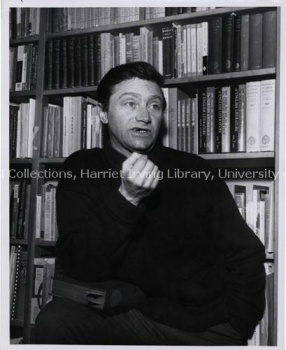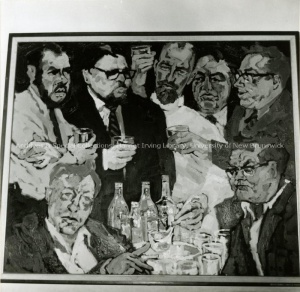Department of English
Previously named: Modern Languages and Literature; Modern Science and Literature; English Language and Literature and Mental and Moral Philosophy; English Language and Literature; English and French Languages and Literature; English, French and German; English and Modern History.
Established: 1909
History: At the time of the establishment of the University of New Brunswick, the study of English fell under the heading of 'Modern Languages and Literature'. There was one mandatory English class scheduled in each of the three years of a Bachelor of Arts degree until 1867 when the English requirement was removed from the senior year. The two remaining English classes were the extent of the course offerings until approximately 1886 when the B.A. curriculum was extended to four years and English once again became mandatory in every year of the degree. English remained a mandatory course in all four years of a B.A. until 1901 when it became an elective in third and fourth years. Between 1867 and 1886, the study of English fell under the additional headings of 'Modern Science and Literature'; and 'English Language and Literature and Mental and Moral Philosophy'. In 1886, English amalgamated with the study of French and took on the heading of 'English and French Languages and Literature' until 1908 when German was added to the department. In the 1909-1910 academic year, English was established as an independant chair for the first time under the heading 'English Language and Literature'. In 1912, English was shuffled to join with the study of Modern History. These two disciplines would remain connected until 1938 when History was also given its own chair and the two were henceforth separate departments.
While English had always been in one form or another a mandatory part of an arts degree at the university, it remained a field of study with only a single regular course offering in each term of school until 1941. These regular courses were coupled with a few honours classes for students electing to pursue an honours degree in English. In 1941, the English department expanded for the first time to give students a choice of regular classes by offering one alternative course in each term of the third and fourth years of an arts degree. At the time of this first expansion, there were a total of eleven English courses, including honours classes, offered by the university. For the next twenty years, the size of the English department remained fairly static only growing to fifteen courses by 1961; however, the department doubled in size and offered thirty classes by 1970. The size of the department remained the same until the mid-eighties when the course offerings grew to reach over fifty classes and since then, it has grown to just over sixty in 2010. The university's English Department is also responsible for publishing Canada's longest living literary journal [The Fiddlehead] which was first printed in 1945; and for founding the Goose Lane Editions literary press in 1981.
Physical location: Carleton Hall
Faculty: Arts
Notes: Creative writing has been a tradition at UNB since its earliest years when two of "The Confederation Poets", [Bliss Carman] (B.A. 1881) and [Sir Charles G. D. Roberts ](B.A. 1879), attended the school. Since the 1940s, the English Department has been a centre for flourishing Canadian creative writers, and past graduates of the M.A. Creative Writing Program have included award winning authors such as Wayne Johnston, Frances Itani, Rabindranath Maharaj, Matt Robinson, and Sue Sinclair. UNB was also the first university in Canada to have a Writer-in-Residence program, beginning in 1965 with Norman Levine.
The year that a certain department was established can be a subjective figure. For the purpose of this wiki, the year that a department is considered first established is the first year it was listed in the academic calendar as an independent chair with no other affiliation, unless documentation can demonstrate otherwise.
Source(s):
- UNB Calendars (UA RG 86), 1862- 1880, 1886-1890,1938, 1939,1940-1960 1970-1980,1990-2000,
- The Fiddlehead [website]
- English Department website, [Writer-in-Residence]
- Dictionary of Canadian Biography Online, [Bliss Carman]
- Canadian Poetry Archive, [Charles G.D. Roberts]
- UA Case 191
--TonyGoss 31 January 2013 (ADT)
© UNB Archives & Special Collections, 2014

